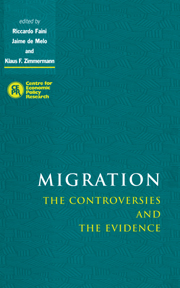Book contents
- Frontmatter
- Contents
- List of figures
- List of tables
- Foreword
- Acknowledgements
- List of conference participants
- 1 Trade and migration: an introduction
- PART ONE INSIGHTS FROM THEORY
- 2 Trade liberalisation and factor mobility: an overview
- Discussion
- 3 Regional integration, trade and migration: are demand linkages relevant in Europe?
- Discussion
- 4 Beyond international factor movements: cultural preferences, endogenous policies and the migration of people: an overview
- Discussion
- 5 Trade liberalisation and public-good provision: migration-promoting or migration-deterring?
- Discussion
- PART TWO QUANTIFYING THE LINKS BETWEEN TRADE AND MIGRATION
- PART THREE HISTORICAL AND CONTEMPORARY EVIDENCE
- Index
5 - Trade liberalisation and public-good provision: migration-promoting or migration-deterring?
from PART ONE - INSIGHTS FROM THEORY
Published online by Cambridge University Press: 10 May 2010
- Frontmatter
- Contents
- List of figures
- List of tables
- Foreword
- Acknowledgements
- List of conference participants
- 1 Trade and migration: an introduction
- PART ONE INSIGHTS FROM THEORY
- 2 Trade liberalisation and factor mobility: an overview
- Discussion
- 3 Regional integration, trade and migration: are demand linkages relevant in Europe?
- Discussion
- 4 Beyond international factor movements: cultural preferences, endogenous policies and the migration of people: an overview
- Discussion
- 5 Trade liberalisation and public-good provision: migration-promoting or migration-deterring?
- Discussion
- PART TWO QUANTIFYING THE LINKS BETWEEN TRADE AND MIGRATION
- PART THREE HISTORICAL AND CONTEMPORARY EVIDENCE
- Index
Summary
Introduction
Since its establishment in 1947, several rounds of GATT negotiations have promoted the liberalisation of international trade in commodities. Meanwhile, numerous preferential trading agreements (APEC, CARICOM, NAFTA) have deepened regional economic integration among countries willing to go further. Recognising the importance of barriers in services trade, including labour services, as costly as commodity trade barriers, the Uruguay Round (1994) extended the principles of goods trade liberalisation to service markets, through the General Agreement on Trade in Services (GATS). Moreover, in its constitution, the EU recognises the free mobility of labour as one of the ‘four–pillar freedoms’ that make the European common market ‘an area without internal frontiers in which the free movement of goods, persons, services and capital are ensured’ (EEC Treaty, art. 48 (2)).
Standard international trade theory has prescribed free trade as the regime that maximises the economic welfare of countries without market power, as well as global economic welfare. On the other hand, numerous studies have examined the relationship between free commodity trade and free international movements of factors of production. Within the traditional Heckscher–Ohlin (HO) framework, it has been long established that under free trade and factor–price equalisation (FPE), commodity trade and factor movements are perfect substitutes in a weak and strong version of a quantitative and price-equalisation sense (see Mundel, 1957; Wong, 1995). If under free trade factor prices do not equalise, however, then free trade in goods and factors are substitutes in the weak price-equalisation sense and in the weak and strong quantitative sense.
- Type
- Chapter
- Information
- MigrationThe Controversies and the Evidence, pp. 94 - 112Publisher: Cambridge University PressPrint publication year: 1999



